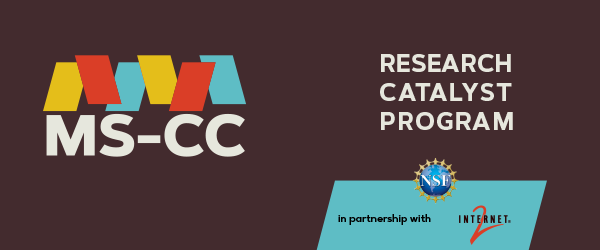MS-CC Research Catalyst Program 2025 Projects

Overview
Congratulations to our project teams! After participating in a rigorous application process, the following Institutions received funding for their projects:
- Benedict College
- Hampton University
- Howard University
- Meharry Medical College
- North Carolina A&T State University
Their project agreements will define metrics, outcomes, and timelines based on each application and MS-CC’s NSF award requirements.
PI Profiles & Project Abstracts
AI Collab Hub: Accelerating Interdisciplinary AI Research and Cyberinfrastructure at Howard University
PI: Saurav K. Aryal, PhD
Institution: Howard University
Category: Research Computing & Data
Focus Tags: AI, LLMs, GPU, HPC, NVIDIA, Collaboration, Training
Abstract: Howard University, recognized as the first Historically Black College or University (HBCU) to achieve R1 status, is committed to driving innovation in artificial intelligence (AI) across academic disciplines. Responding to the national imperative of democratizing access to advanced AI resources and expanding interdisciplinary collaboration, this project will establish an AI Collab Hub—a centralized initiative to accelerate AI-related research across the university.
Intended impacts include supporting at least five new AI research projects in Year 1, facilitating three new external grant proposal submissions, training at least 20 students in GPU-based AI methods, and documenting campus-wide cyberinfrastructure needs for future planning. Through robust evaluation metrics, the project aims to increase scientific output, expand the base of campus CI users, and serve as a scalable model for peer institutions. By advancing research capacity and workforce development in AI, the AI Collab Hub will catalyze innovative scholarship at Howard University, foster inclusive access to advanced cyberinfrastructure, and establish a replicable framework for empowering HBCUs and TCUs nationwide.
Contact:
PI – Saurav K. Aryal, PhD
Measuring Cyberinfrastructure Effectiveness at North Carolina Agricultural and Technical State University
PI: Thomas Patterson, PhD
Institution: North Carolina A&T State University
Category: Research Computing & Data
Focus Tags: DataLab, Workshops, HPCAccess, Training, Assessment, LibraryCI
Abstract: North Carolina A&T State University—now the nation’s largest Historically Black College or University and a national leader in STEM—proposes a transformative initiative to enhance campus research capacity by positioning its FD Bluford Library as a central hub for cyberinfrastructure support and innovation. The project aims to establish a research services department and an advanced data lab designed to connect researchers to high-powered computing, software, and data-focused training. The cornerstone of the effort is a comprehensive user-needs assessment, engaging faculty, IT professionals, campus leadership, and the research office to map the CI organization and identify gaps that impact research success.
In tandem, faculty will participate in workshops and conferences to build expertise for developing new campus-wide training sessions and research support services. The anticipated outcomes include a robust public report to guide CI strategy, a replicable library-based research support framework, and a suite of workshops and events enabling deeper CI engagement for researchers and students. The project will serve as a scalable model for other HBCUs and TCUs, supporting peer mentorship and knowledge transfer. By integrating library expertise and campus IT infrastructure, NC A&T will enhance research excellence, promote interdisciplinary collaboration, and strengthen data-driven scholarship as the university advances toward an R1 research classification.
Contact:
EduCyber: Piloting an AI-Driven Educational Chatbot on Cyberinfrastructure to Enhance Student Engagement at Benedict College
PI: Hong Jiang, PhD
Institution: Benedict College
Category: Student Engagements
Focus Tags: Chatbot, AI, LMS, AWS, FERPA, Dashboards, DataAnalytics
Abstract: Benedict College proposes EduCyber, an innovative initiative to pilot an AI-powered chatbot and integrated cyberinfrastructure platform aimed at advancing educational research and student engagement. This one-year project will develop, deploy, and assess a conversational AI tool that collects both qualitative feedback and quantitative metrics from students, providing real-time insights to inform pedagogical strategy. Leveraging secure, cloud-based data management, the platform utilizes FERPA-compliant AWS S3 storage and integrates with the campus learning management system for robust, scalable research capabilities.
EduCyber will equip faculty and administrators with interactive visualizations—built using Plotly Dash—to identify engagement trends and improve course delivery, while also training a diverse team of graduate and undergraduate researchers in AI, data management, and ethical AI practices. Deliverables include the implemented chatbot, a secure data repository, engagement dashboards, comprehensive reports, and conference presentations. By embedding the solution within existing IT infrastructure, EduCyber ensures sustainability, expands cyberinfrastructure capacity, and lays the foundation for broader deployment at HBCUs and TCUs.
Contact:
PI – Hong Jiang, PhD
CyberXPert: Advancing Cyberinfrastructure Innovation in Education and Workforce Development at Meharry Medical College
PI: Uttam Ghosh, PhD
Institution: Meharry Medical College
Category: Training & Workforce Development
Focus Tags: LLMs, AdvisorX, InstructorX, Cybersecurity, NISTNICE, GPU, Bootcamps
Abstract: Meharry Medical College proposes the CyberXPert initiative to strengthen institutional cyberinfrastructure capacity and cultivate a skilled technical workforce through innovative educational technologies and collaborative training. The project centers on the deployment of the AI-powered EduCore framework, integrating Large Language Models (LLMs) to automate academic advising, course design, and career planning via InstructorX and AdvisorX agents. CyberXPert incorporates modular course design, expert seminars, immersive bootcamps, and faculty development workshops, emphasizing workforce development and broadening participation in cybersecurity, data science, and AI domains.
The initiative will implement hands-on, NIST NICE-aligned training, aiming to reach over 70 learners and establish a robust mentoring scheme for graduate students and researchers. A new GPU-based workstation will support real-time AI model development, while NSF ACCESS and cloud partnerships further enhance CI resources. By automating routine educational tasks, providing practical CI learning experiences, and fostering interdisciplinary collaboration, Meharry Medical College will position itself as a leader in CI research, instruction, and workforce development, providing a scalable model for other HBCUs and TCUs.
Contact:
PI: Uttam Ghosh, PhD
Co-PIs: Sajid Hussain, Puspita Chatterjee, Asmah Muallem, Lei Qian
HU-CI Growth Readiness Study: Assessing and Expanding Cyberinfrastructure Capacity for the AI Innovation Center at Hampton University
PI: Adebisi Oladipupo, PhD
Institution: Hampton University
Category: Research Computing & Data
Focus Tags: CIAssessment, AI Innovation Center, MixedMethods, Surveys, Focus Groups, Roadmap
Abstract: Hampton University is committed to advancing campus-wide research and supporting interdisciplinary innovation through the development of an AI Innovation Center. The HU-CI Growth Readiness Study proposes a comprehensive assessment of the university’s current cyberinfrastructure (CI) to identify gaps and needs that will inform future investments and upgrades. Leveraging campus-wide collaboration between the Information Technology Division and the Division of Research and Sponsored Programs, this project will develop a replicable CI assessment model, conduct an inclusive needs analysis with robust stakeholder engagement, and disseminate findings to increase CI awareness and inform institutional planning.
Through a one-year, exploratory sequential mixed-methods approach, incorporating focus groups and campus-wide surveys, the study will generate actionable recommendations for CI investment supporting research activities, especially those linked to the AI Innovation Center in computer science, engineering, public health, and climate science. The proposed assessment model will ensure long-term sustainability and adaptability in response to changing research demands and administrative transitions. By strengthening Hampton University’s digital backbone and fostering interdisciplinary collaboration, the HU-CI Growth Readiness Study will position the institution for future growth, external funding opportunities, and serve as a model for other HBCUs and TCUs seeking to enhance their research capabilities.
Contact:
PI: Adebisi Oladipupo, PhD
Co-PI: Neelam Azad
